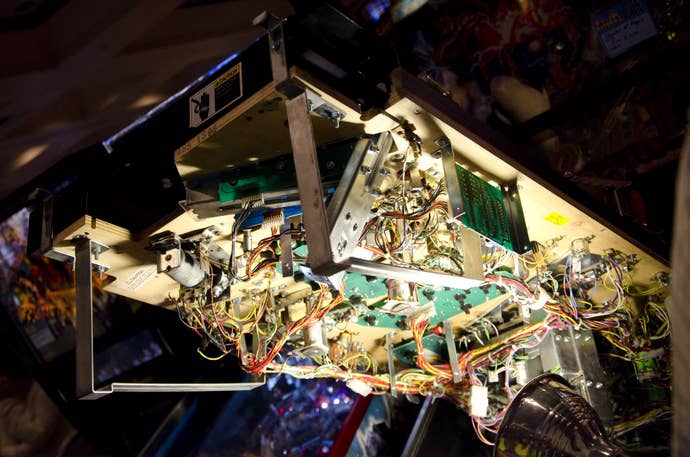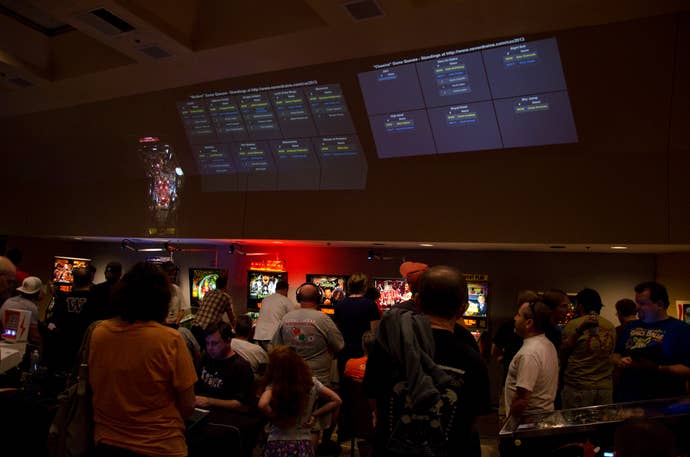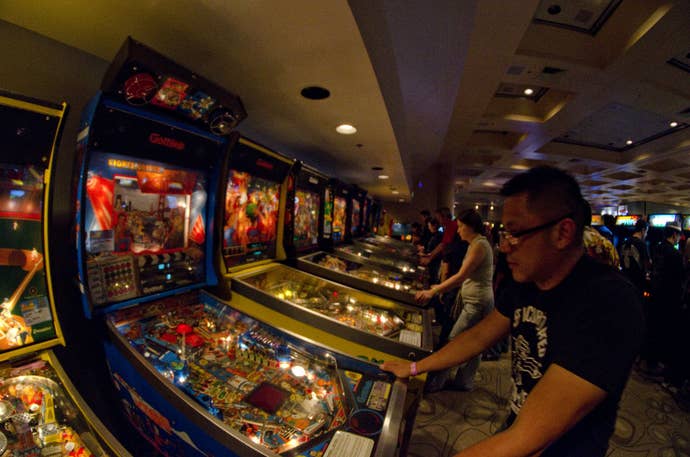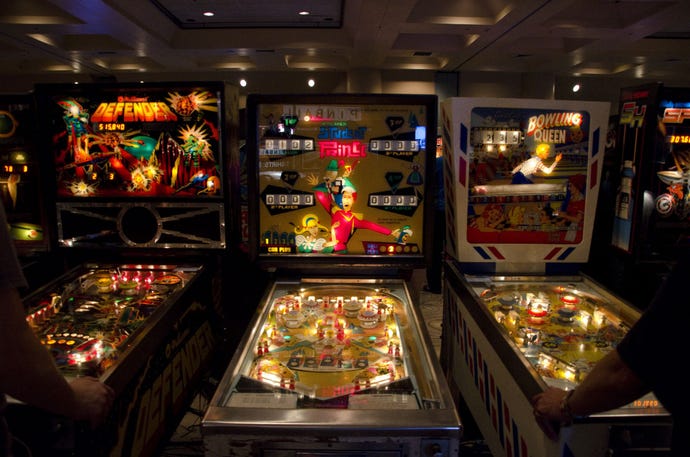Flipping Out Over Pinball Machines
At California Extreme last month, we investigate how and why pinball is coming back.
This article first appeared on USgamer, a partner publication of VG247. Some content, such as this article, has been migrated to VG247 for posterity after USgamer's closure - but it has not been edited or further vetted by the VG247 team.
Andy Kuntz cuts a vivid sight. He wears neon colors -augmented by periwinkle-blue Hello Kitty Shoes and animal prints - with all the aplomb of a Wall Street banker. We're at California Extreme, a coin-op gaming convention, and it's kind of rad. The massive hall in which all this is housed is a veritable collage of machinery, eager players, softly glowing LEDs and bloops and bleeps of every sort.
"No, this belongs to a friend of mine." Kuntz remarks, when I ask about the disemboweled pinball machine beside him, its insides reminiscent of an artist's interpretation of a car engine.
We talk about the small things: his job as an 'operator' ("I take machines like these and operate them in the Bay Area.", what he's doing on the show floor ("I just showed up to maintain things. Enjoy a little bit."), the number of machines he personally owns ("More than 50, less than a 100."), and whether our interview is impeding his repair work ("Nope!").

"Why do you think pinball machines are coming back?" I ask after we've exhausted the formalities. Ever since Williams Electronics, a former superpower on the board, pulled the curtains on its pinball-related endeavors following a last desperate attempt at revitalizing sales in 1999, the Internet has been rife with commentary about how pinball tables are tottering on the brink of extinction. Yet, such defeatism was absent from California Extreme. All afternoon, I was told that pinball machines are on the rise again, that they've never been so popular.
Desire, Kuntz explains, and places to fulfill that desire.
"For a while, it kinda got forgotten because there was just no place to play. When gaming moved indoors, pinball machines were left in the cold. Now, you have places like Ground Control in Portland. They've come with a business model called the Barcade. It's not just pinballs and arcade machines. It's a bar. They're showing art there. They're doing a number of different things. More and more people are seeking stuff like this out. The Internet, obviously, is helping things along."
He adds, "And then you get a lot of people - the older crowd- going, 'What happened to all the arcades? What happened to pinball? Where can we play that?' Back in the day, we had all those nerds who spent all that time in the arcades. They grew up. They got dot com jobs. They came back and started buying stuff like Galaga, Ms. Pacman and so on. There was a little bit of that ten years ago. We're seeing some of that again but it's now more of a case of the really nice machines being hoarded. They're getting bought by people and getting stored in their homes. They're collectors' items. People don't want them in the real world, taking all of that abuse."
"The machine is like their baby, it's their Ferrari they never take for a ride."
***
Mark Steinman ranks 87th in the International Flipper Pinball Association rankings. He is also director for the Professional and Amateur Pinball Association, or PAPA. When I ask if interest in pinball has been dwindling, he responds with vehement negation. "Pinball over the last few years have experienced a tremendous boom. There are more manufacturers producing pinballs now that there has been for over a decade. The interest from the player perspective is skyrocketing. Every year, thousands of new players are entered into our ranking systems."
Akin to so many other activities, pinball is often an obtuse science to its neonates, a game of chance as much as it is a game of skill. "A novice player might not understand the game has rules or that they're in charge of what happens."

"Everything in a pinball game is determined by what the player does." Steinman stresses with all the gravitas of a historian. "As you play more and more, you learn that everything that occurs is your responsibility and is caused by you in some fashion. So, as you gain more experience and move more towards the professional realm, you start realizing you are in total control."
"One of the beautiful things about pinball is that it challenges people in so many different ways. It can be a cerebral game in terms of making the right decisions at the right time so you control what modes you come up with and working certain combinations that occur in the game or it can be control in terms of actually making the ball go wherever you want it to go."
***
Though much loved for its complexities, the appeal of the ball-and-the-flipper, for some, is a considerably more visceral thing.
"You can feel it.You can touch it. It's tangible. It's something, for use of an oxymoron, predictably wild. You never know what's going to happen and you can count on that. Even when a ball shoots out from the same hole in the same way at the same strength, there can still be variations. Sometimes, it might have been resting a little differently so it'll kick out in a slightly different direction. It might hit something. It's chaos in motion."
When James 'Greywolf' Graham talks about pinball machines, his voice takes on the kind of reverence most would reserve for deities. A middle-aged man with a respectable beard, Greywolf had just returned to the Hyatt Regency where California Extreme 2013 is held after sending his children to their respective destinations. Like Kuntz, he sustains himself through his hobby: Greywolf works with a place called Random Spherical Collisions, a business that specializes in the repair of Electro-Mechanical (EM) Pinball Tables.

"I had a love of pinball itself since I was 9. I learned the basics of electronics and electricity in college. And one thing led to another; I eventually ended up getting my own games in 1998."
He owns seven pinball tables privately, but has a wish list that spans 20 more. I ask him what is his favorite thing about pinball machines, about what drives that decades-long passion and he tells me what I already know: it's the nostalgia. But it also goes beyond that.
"A lot of it is just I love the sounds that some of them make." Greywolf enthuses. "The stuff the electro-mechanical tables produce go without saying. The few I have that are solid states, I really enjoyed the sounds when they first came out. For me, those hit sort of a pinnacle of creativity with sounds back then."
On top of all the reasons we've discussed so far, Greywolf says he believes the renewed interest in pinball machines can partially be attributed to fatigue. In a time where so little remains tactile, pinball machines represent both a refreshing solidity and an unpredictability that can be lacking in modern games. "You can influence it. The ball comes down. It hits a bump, maybe. It tries to bounce out. You can jostle it just so that it comes right back."
"It's something tangible in a digital age."
Photos were courtesy of talented NYC-based photographer Kevin Lee.

